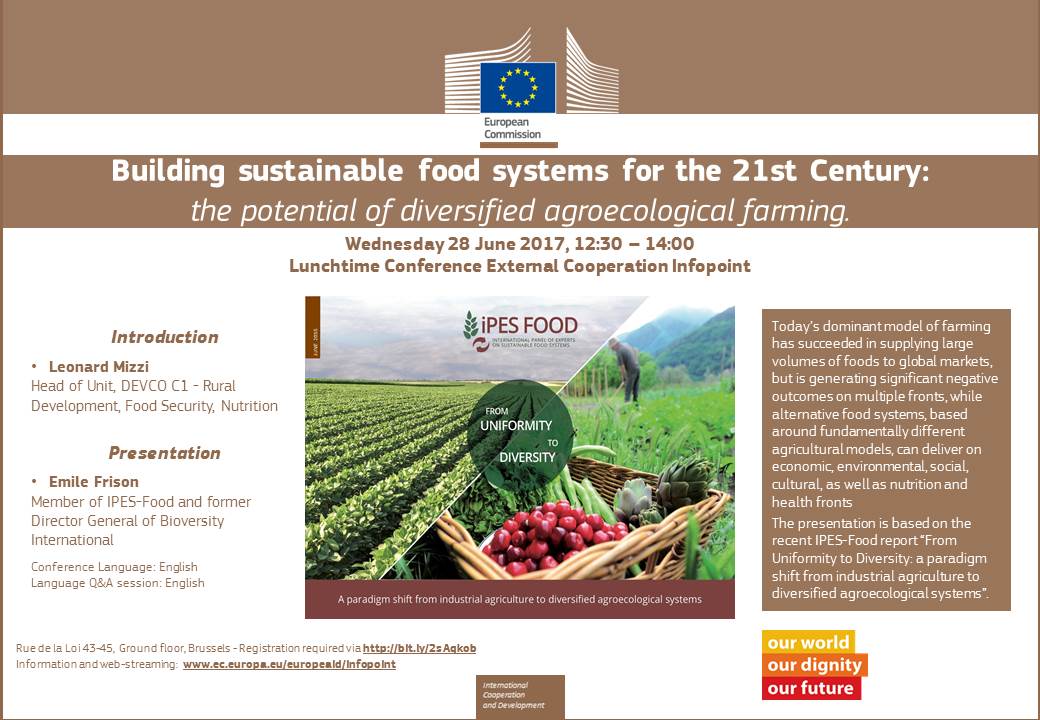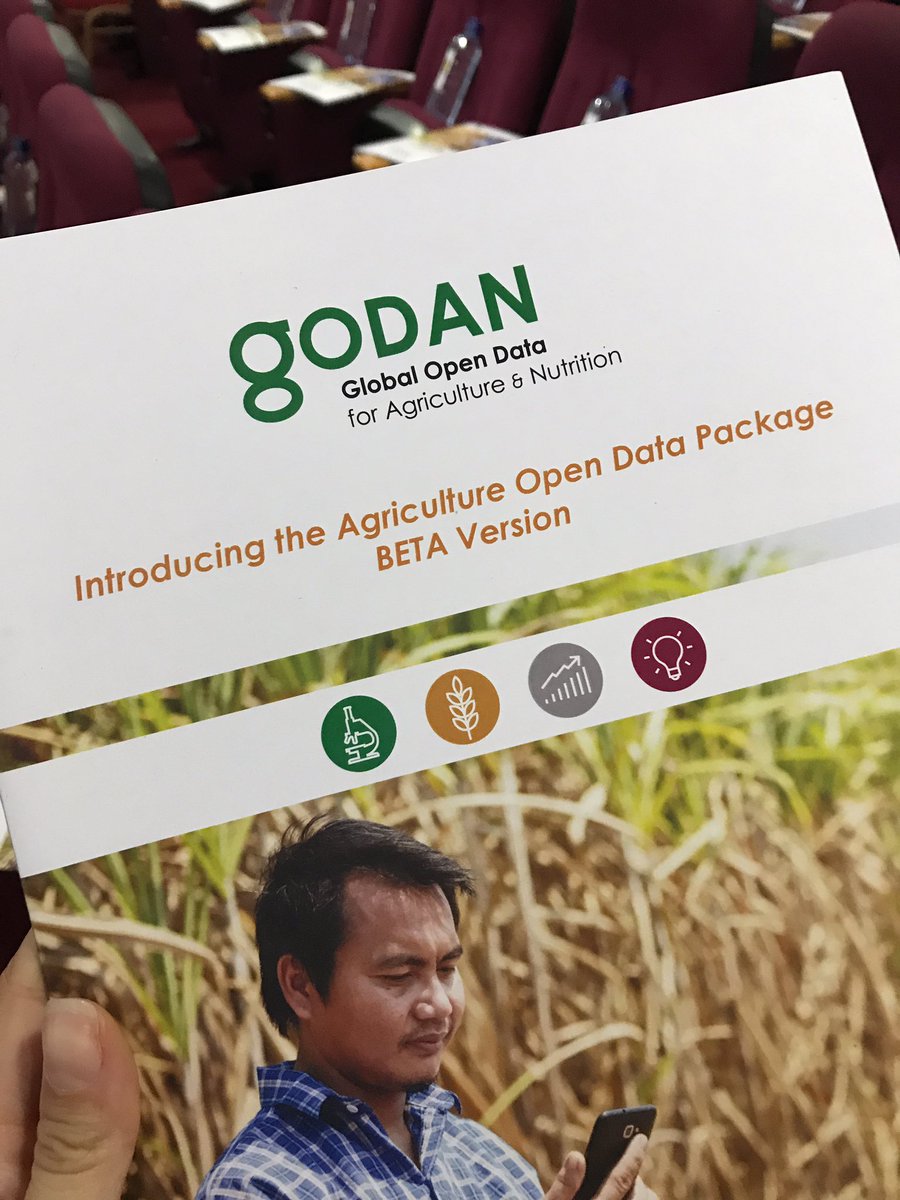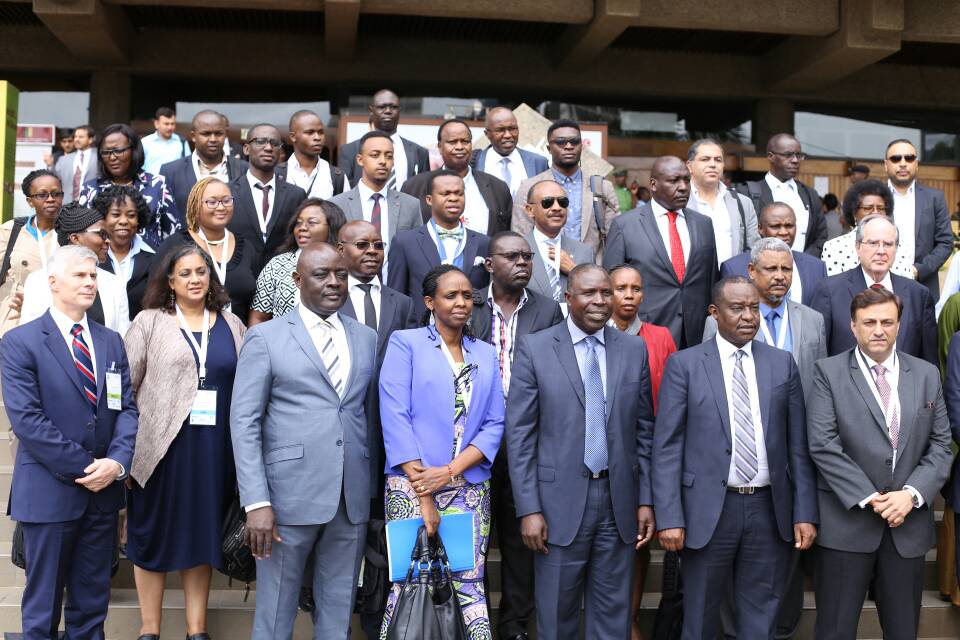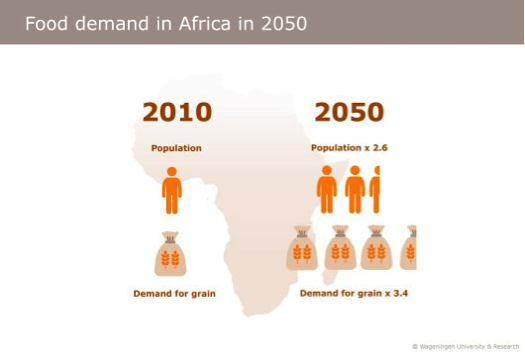The Biosciences eastern and central Africa (BecA) Hub awards research fellowships to African agricultural researchers for short-term projects at the BecA-ILRI Hub in Nairobi. The announcement identifies the priority research themes. Deadline:
The European Commission will provide funding to collaborate with Burkina Faso on strategies and institutional reforms that improve agricultural sustainability and nutritional security in Burkina Faso. Eligibility for funding extends to nonprofit NGOs in countries of the EU and countries of the ACP agreement (including Burkina Faso). Grants will range from €1.5 million to €2.0 million, varying with cost shares. Reference EuropeAid/155765/DD/ACT/BF. The closing date for applications is 11 July 2017.
Seed funding to expert groups food security and nutrition in low-income countries
Swedish International Agricultural Network Initiative (SIANI) offers
seed funding to expert groups that support its vision and mission to understand emerging issues in
food security and nutrition in low-income countries. Expert groups comprise a diverse group of stakeholders (academia, NGOs, private business, government, etc.) to prepare publications, organize events, and engage in other activities that strengthen the Swedish resource base and their partners. Expert groups do not need to be geographically located in Sweden. However, if an expert group is established outside Sweden, it needs to have a clear link to the Swedish resource base and Swedish funded activities. The deadline for proposals is
15 July 2017.
The KULIMA program will provide facilitation and coordination to a pool of eight thousand community-based facilitators and over thirteen thousand local farmer groups to address farm productivity and diversification while conserving natural resources. Eligibility for funding of up to €14 million (subject to cost shares) extends to NGOs, public sector operators, local authorities, and inter-governmental organisations. Reference EuropeAid/155474/DD/ACT/MW. The closing date for applications is
.
Improved Nutrition in Senegal
USAID announces funding of a 5-year project through the program Feed the Future to
improve diets among the Senegalese population, particularly young children and women of reproductive age in selected zones of the country. Efforts may include expansion of nutrient-dense and bio-fortified crops such as orange-fleshed sweet potato, high-protein maize, iron-rich millet, moringa, mung bean, Sahel apple, and others — in addition to project activities that will improve food governance and increase women’s empowerment on matters of food selection. Deadline:
24 Jul 2017
Building Capacity in Research Teams 2017
Through its program JEAI, France’s Institute for Development Research makes grants of up to €50 thousand for periods of three years to build the capacity of research teams in the developing world. Thematic areas include sustainable energy; water resources; climate change; ecosystems and biodiversity; agriculture and food safety; and several others. The supported teams will work closely with IRD. IRD recommends that applicants communicate with its relevant research units before submitting their applications. The deadline for applications (French, English) is 26 July 2017
The Erbacher Foundation supports rural development in subject areas that include
. The priority countries are India, Tanzania, and Uganda. Applications are invited from Germany charitable organizations involved in development cooperation. Applying organizations need to have partnerships with local NGOs. The German institution is responsible for project administration and coordination. Next application deadline is
.
Leadership skills in agricultural research management
Australian Center for International Agricultural Research awards the John Dillon Fellowship
to young agricultural scientists and economists in developing countries for professional visits to Australia. The fellowships aim to develop leadership
skills in agricultural research management, agricultural policy, and/or extension technologies. Applicants are citizens of ACIAR’s priority partner countries who spend several weeks at one or two host Australian organizations. ACIAR funds eight to ten John Dillon fellowships per year. The deadline for applications is
31 August.
Grants to Strengthen Farming Communities 2017
The Monsanto Fund makes grants to strengthen agricultural communities in several countries around the world. Grants of US$25 thousand and more are available to tax-exempt charitable organizations for activities and projects that
address farmers’ education and training; food security; community water and sanitation; and other local needs. Monsanto’s international grants are administered at the country level. The Fund presents a list of eligible countries. Monsanto accepts international applications during two periods each year. The next period ranges from
01 July through 31 August
Agribusiness
New Africa fund targets women-led agribusiness
Victus Global Capital and Altree Capital have partnered to launch a US$50mn fund focusing on investment into
women-led agribusinesses in Africa. The fund aims to boost African agriculture through the practice of so-called ‘gender lens investing’, which focuses on funding women-owned businesses, companies with a track-record of hiring women, and those that aim to improve the lives of women through their products and services.
Standards and Trade Development Facility
STDF provides support to developing countries through project preparation grants (PPGs) to prepare technically sound and sustainable projects. Funds up to normally US$50,000 are available for PPGs, which can involve the application of SPS-related capacity evaluation tools, prepararation of feasibility studies and/or formulation of project proposals to address specific SPS capacity building needs linked to trade. Next deadline for funding applications: 04 August 2017
Connecting larger agricultural and forestry SMEs to finance
The Finance Alliance for Sustainable Trade (FAST) officially launched Finance Connect, a service created to
connect larger agricultural and forestry small and medium enterprises (SMEs) in developing countries that have financing need of more than USD 800,000 and up.
Diaspora Investment in Agriculture (DIA) initiative
This major partnership seeks to leverage the
contributions of migrant workers and encourage their engagement in sustained economic development
through investment in agriculture, particularly in rural areas.
Win investment for your start-up at Pitch AgriHack West Africa 2017!
Pitch AgriHack West Africa 2017 is open for young
ICT start-ups from the West African region offering services to the agriculture sector. The entrepreneurs should be owners of an already developed e-agriculture/ICT4Ag application or platform. The final and announcement of winners will be held during an international conference that will be held in Côte d'Ivoire in September 2017!
Deadline:
09 Jul 2017
Innovations Against Poverty
Sida’s program “Innovations Against Poverty” (IAP) invites the private sector to develop products, services, and business models that contribute to the fight against poverty and climate change. The program is designed for companies which are operational or plan to enter the market (with a local partner in case of international companies) in any of energy; water and sanitation; agriculture and food; and ICT. IAP is active for Cambodia, Ethiopia, Uganda, and Zambia. The program provides advisory support and non-reimbursable funding for up to 49% of total investment ranging from €50 thousand to €200 thousand. The application deadline for concept notes is 24 July 2017
SEED is a global partnership founded by UNEP, UNDP, and IUCN to promote eco-enterprises. The program announces its next cohort of replicator and starter workshops in
Ghana, Kenya, Uganda, and South Africa. The replicator workshops of one day introduce motivated individuals to proven business models from different sectors, with a follow-up process to match them with existing entrepreneurs. The starter workshops are incubation programs for teams with eco-inclusive business ideas, consisting of five workshop days and a test phase. The application deadlines are
02 July through 22 July 2017 for the starter workshops (also varying by country).
Danida Market Development Partnerships 2017
Danida Market Development Partnerships promote the achievement of the Sustainable Development Goals. Focusing on SDG 8, the main objective is to promote sustainable local economic growth and
employment in developing countries in agriculture, energy, and other sectors. Applications are invited from consortia that
include a business partner and an administrative partner, and possibly including additional partners from civil society, government, universities, etc. The program is available in Denmark’s priority countries for development assistance, and in selected other countries below the World Bank limit of lower-middle income countries that have a Danish representation. Danida’s support to the partnership project may cover up to 75% of total project costs.The deadline for concept notes is
15 September 2017.
De-risking agricultural value chain financing
1 June 2017. Kampala. 13th CAADP Partnership Platform. Break-out session on de-risking agricultural value chain financing
Business opportunities in the framework of Europe's climate actions outside the EU
18 May 2017 Brussels. The regions of Flanders and Catalonia co-organized a seminar and matchmaking event for te private sector, educational and research organizations and civil society organizations as important partners in reaching the climate objectives.
Bio-diversity, environment, climate change
The Swedish International Development Agency (Sida) funds short-term training in selected development topics for participants from developing countries. The Africa program includes a course on
Climate Change – Mitigation and Adaptation for participants from
Botswana, Mozambique, and Zambia. This round of the training programme has a special focus on water resources for agriculture, water supply, hydropower, etc. Candidates representing government organisations, private companies, and NGOs are encouraged to apply. The training will be provided in three parts, divided between Sweden and Africa. The closing date for applications is
17 July 2017.
Climate Change Adaptation projects and programs
The United Nations Framework Convention on Climate Change Adaptation Fund makes grants for projects and programs that address the
adverse impacts of climate change. Eligibility for grants extends to countries which are Parties to the Kyoto Protocol, with emphasis on developing countries that are particularly vulnerable to the adverse effects of climate change. Grants are primarily to government organizations such as national ministries, development institutes, local government authorities, and others — sometimes in partnership with civil society organizations. Project proposals are submitted through any of the Fund’s national, regional, or multilateral implementing entities. The next deadline is
07 August 2017.
Grants for Biodiversity and Cultural Diversity
The Christensen Fund makes grants to indigenous-led and community-based organizations for projects that combine
biodiversity with cultural diversity. Pre-proposals are accepted for consideration in the following programs: African Rift Valley; Central Asia; Northwest Mexico; Melanesia; Global; and San Francisco Bay Area. Most grants are in the range of US$50 thousand to US$100 thousand for one or two years. The application period for pre-proposals is
01 August through 31 August 2017.
Small Grants for Biodiversity ConservationThe Van Tienhoven Foundation for International Nature Protection promotes the protection, conservation, and sustainable use of ecosystems and their living organisms. The Foundation aims to counter the human-induced causes of threats to biodiversity. Grants are for
projects outside of the Netherlands, and they should be initiated and owned or widely supported by local stakeholders. Government organizations are excluded from applying, and academic studies are not supported. The maximum grant is €10 thousand. The next application deadline is
15 August 2017.
Grants for Grassroots Conservation 2017
The New England Biolabs Foundation makes grants to grassroots and charitable organizations to support conservation of
biological diversity; ecosystem services; community food security; and marine environment. The geographical scope includes selected and conservation sub-regions of Central America, the Andean region of South America, and West Africa. Grant seekers should review the geographical priorities carefully. Maximum grant size is US$10 thousand, although most grants are smaller. The next periods for letters of inquiry (English, Spanish) is
01 July through 15 August 2017.
Climate and Agriculture in Senegal
The “Program of Development and
Adaptation to Climate Change of Irrigated Crops in Senegal” calls for proposals. The program aims to improve the socio‑economic well-being and resilience of farming households, with a particular emphasis on women and young people. Applications are invited from experienced and qualified Canadian organizations and consortia that may include Canadian with non-Canadian organizations. Preference will be given to projects in partnership with one or more Senegalese organizations. Grants are CAD$13 million to CAD$18 million for projects of five years. The deadline for applications (English, French) is
31 August 2017.
Funding for Arboriculture and Urban Forestry
The Jack Kimmel International Grant Program makes grants to researchers in arboriculture and urban forestry worldwide. Projects of one to three years are funded to a maximum of US$10 thousand. The application deadline is 01 October 2017
Fellowships/scholarships/grants
Graduate Scholarships in Sub-Saharan Africa
The German Academic Exchange Service (DAAD) announces scholarships for qualified Sub-Saharan Africans to pursue masters and doctoral studies at the Regional Studies Center to Ameliorate and
Adapt to Drought (CERAAS) in Senegal. The program offers up to three PhD scholarships and four masters’ scholarships. Some of the scholarships are for in-country applicants in Senegal, and others are open to applicants across Sub-Saharan Africa. The fields of study are physiology, genetics, genomics, agronomy, plant breeding, plant health, and agroforestry. The application deadline is
28 July 2017.
Training in Strategic Environmental Assessment
Sida funds short-term training in selected development topics for participants from developing countries. The Africa program includes a course on
strategic environmental assessment, with a focus on energy. Participants may be nominated by organizations and agencies within the energy sector that work actively with energy plans, policies, and programmes at national or regional levels. The following countries are invited to nominate candidates: Kenya, Mozambique, Rwanda, Tanzania, and Zambia. The training will be provided in two parts, first in Sweden and then to be decided. The closing date for applications is
31 July 2017
Masters Scholarships Integrated Water Management
Australia’s International Water Center announces funding for three international candidates accepted into the Master of
Integrated Water Management. Two scholarships will cover full tuition and living expenses, and a third will cover full tuition. Applications are invited from eligible countries in Asia-Pacific; Africa; Latin America and Caribbean; the Middle East; Europe; and North America. The application deadline is
01 August 2017
Fellowships to young agricultural scientists and economists
The Australian Center for International Agricultural Research ACIAR awards the John Dillon Fellowships to
young agricultural scientists and economists in developing countries for professional visits to Australia. The fellowships aim to develop leadership skills in agricultural research management, agricultural policy, and/or extension technologies. Applicants are citizens of ACIAR’s priority partner countries who spend several weeks at one or two host Australian organizations. ACIAR funds eight to ten John Dillon fellowships per year. The deadline for applications is
31 August.
Genetic Engineering and Biotechnology Fellowships
The International Center for Genetic Engineering and Biotechnology (ICGEB) offers PhD, Postdoctoral and Short-term fellowships in Life Sciences to scientists from ICGEB’s member states. The fellowships are for research at collaborating universities in Trieste, New Delhi, and Cape Town. Application deadlines: Short-term fellowships
30 June, 30 September, 31 December.
International Water Center — International Masters Scholarships 2018
Australia’s International Water Center announces funding for three international candidates accepted into the Master of
Integrated Water Management. Two scholarships will cover full tuition and living expenses (Type A Scholarship), and a third will cover full tuition (Type B Scholarship). Applications are invited from eligible countries in Asia-Pacific;
Africa; Latin America and Caribbean; the Middle East; Europe; and North America. Note: Eligible countries for Type A are different from Type B. The application deadline is
01 August 2017.
International Cooperation in Aquaculture 2018
The Research Council of Norway funds international cooperation in its HAVBRUK2 program of aquaculture research. Funding is available for project establishment support for international projects; personal visiting researcher grants; and personal overseas research grants. Priority will be given to collaboration with researchers in the EU, USA, Canada, China, Japan, India, Chile, and Brazil. Collaboration with researchers in other countries will also be of interest. The application deadline is 06 September 2017.
Japan Society for the Promotion of Science The RONPAKU fellowships are a program of the JSPS to support students from Asia, the Middle East, and
Africa to pursue PhD degrees at Japanese universities. Each fellow submits a research dissertation co-supervised by an advisor in Japan and an advisor in the fellow’s home country. The fellows do not pursue doctoral courses in Japan (i.e., dissertation only). RONPAKU will award about 20 fellowships across all subject areas. The application deadline is
25 August 2017.
ARIMNet2 — Call for Young Researchers
The EC’s ARIMNet is a consortium to support integrated and trans-disciplinary research that enhances the contribution of a
gricultural and food systems for sustainable social and economic development in the Mediterranean Basin. The ARIMNet2 2017 Joint Call is dedicated to young researchers in two topics: promoting sustainable agriculture for socio-economic development; and valorising local products through food value chains improvement. The participating countries are Algeria, Croatia, Egypt, France, Morocco, Slovenia, Spain, Tunisia, and Turkey. A project consortium must include at least three young researchers from three different participating countries (at least one from a northern country and one from a southern country). The submission period is
16 August 2017 until 14 September 2017.
DAAD offers scholarships to qualified individuals from eligible developing countries for post-graduate studies at German universities in development-related subjects. The program (EPOS) is open to individuals who completed their previous academic degrees no longer than six years previously; who have at least two years of professional experience; and who are nationals of countries receiving official development assistance (DAC list of the OECD). The available courses range across water resources; renewable energy; land management and tenure; agricultural sciences; forest sciences; ecology; nature conservation; environmental governance; and many others. Most scholarship deadlines for the 2018-2019 intake fall between August 2017 through December 2017, varying by courses (check carefully)
South-South Research and Advanced Training 2017
TWAS offers fellowships to young scientists in developing countries to enable them to spend three to twelve months at a research institution in a developing country other than their own. Eligibility extends to young scientists in any area of the
natural sciences who are citizens of a developing country, and who are employed by a research institution in a developing country. The host institution is expected to provide accommodation and food, as well as research facilities. TWAS provides the airfare and a subsistence allowance. The application deadline is
01 October 2017.
Wageningen UR Center for Development Innovation — Professional Training Courses 2017The Center for Development Innovation (CDI) at Wageningen University in the Netherlands helps build the capacities of individuals and organizations that are addressing the global challenges of
sustainability and food security. Services at CDI include professional short courses in subject areas related to agriculture, genetic resources, pest management, water management, climate change, natural disasters, rural entrepreneurship, and others. Funding for most courses can be applied for through the Netherlands Fellowship Program (NFP) and/or the MENA Scholarship Program (MSP). Many courses in 2017 have NFP/MSP scholarships. Next deadlines
16 October 2017.
Scientific and Technological Research Council of Turkey — Research Fellowships 2017The Scientific and Technological Research Council of Turkey (TUBITAK) awards research fellowships to international highly qualified PhD students and young postdoctoral researchers. Applicants should be non-Turkish citizens who are age 35 or younger. Preference is for candidates who have the potential to contribute to Turkey’s international cooperation in scientific and technological development. The fields of research collaboration include
agricultural sciences, among others. The maximum length of the fellowship is 12 months. The next application deadlines in 2017 are from
05 September through 06 October 2017.
Rothamsted International — International FellowshipsRothamsted International is a nonprofit organization to
advance sustainable agriculture in developing countries. The Rothamsted International Fellowship Scheme has supported around 140 scientists from more than 30 different countries. The program seeks to promote the exchange of skills and technologies between scientists from developing countries and Rothamsted Research. Applications are completed jointly by the candidate and a Rothamsted Project Leader. The next deadline for applications is
16 October 2017
Indian National Academy of Sciences — Visiting Scientists from Developing CountriesIndia’s National Science Academy administers the JRD-Tata Fellowships to support visiting scientists from the developing world and promote
South-South cooperation. The program is open to applicants from developing countries (except India) younger than age 45, and who possess doctorate or masters degrees in science or equivalent degrees in engineering/medicine. Past participants have included several in
agriculture, biological sciences, and geo-sciences. The fellowship is for three months and includes transportation, maintenance allowance, accommodation, and contingencies. The next application deadline is
31 October 2017
AWARDS and O T H E R
Swiss Forum for International Agricultural Research (SFIAR) Award 2017
SFIAR annually awards a prize to scientists working at or in association with a Swiss institution in
agricultural research for development. For 2017, the best team project will be awarded CHF 10 thousand, and the best masters project CHF 1 thousand. To be eligible, research must have been carried out at or in close collaboration with a Swiss institution. The deadline for applications (French, German, English) is
13 July 2017.
Global Development Awards Competition
The Global Development Network (GDN) is offering six finalists the chance to win a prize of up to US$30,000 for their creative proposals under this year’s Global Development Awards Competition, an innovative awards scheme for development practitioners and researchers across the globe. This year, the competition's theme is ‘Skills Development and Employment Generation,’ and adopts a sectoral focus which will reward creative thinking and innovative actions for skilling, technical education and training in the sectors of
agriculture, manufacturing and digital technology. APPLICATION DEADLINE:
16 July, 2017
IPNI Science Award 2017
The International Plant Nutrition Institute (IPNI) is accepting nominations for its annual Science Award. The purpose of the award is to recognize distinguished contributions by scientists involved with global
ecological intensification as related to crop production. Private or public sector agronomists, crop scientists, soil scientists, and food scientists from all countries are eligible. The winner will receive a plaque and a monetary award of USD 5,000. Nomination deadline:
30 September
Global environmental stability
The Prince Albert II of Monaco Foundation makes grants for global environmental stability in themes of
climate change, energy, biodiversity, access to water, and the fight against desertification. In each grants cycle, the Foundation defines priority focus areas within these themes. The geographical scope of grant making comprises the Mediterranean Basin, the Polar Regions, and the
Least-Developed Countries. Grants do not exceed 50% of a project budget. The next period for submitting pre-proposals (French, English) is
03 July 2017 through 11 August 2017
New ways of design and manufacturing for a circular economy
The LAUNCH Nordic Innovation Challenge 2017 focuses on new ways of design and manufacturing for a
circular economy. LAUNCH Nordic aims to select ten innovations to be scaled globally through its international partners, network, and accelerator program. The program is open to innovators worldwide. The deadline for submissions is
01 September 2017.
IDRC Research Awards 2018
IDRC makes research awards to citizens and permanent residents of Canada, and to citizens of developing countries
. The award provides for a one-year paid program of research in addition to hands-on experience in research management, grant administration, and the use of knowledge from an international perspective. Positions are available at
IDRC’s head office in Ottawa and its regional offices in Nairobi and Montevideo. Program areas include agriculture and food security; climate change and water; and several others. Applicants should be enrolled, or have previously completed, their masters or doctoral degrees at recognized universities. IDRC identifies countries not eligible for awards, as well as countries requiring prior approval. The deadline for applications (English, French) is
06 September 2017
Royal Botanic Gardens at Kew Through the Bentham-Moxon Trust, Kew Gardens (UK) makes grants to
botanists and horticulturalists for plant collection and field research; international visits or work at Kew; and travel to and presenting at conferences. The closing date for applications is
30 September 2017.
International Plant Nutrition Institute Science Award 2017
The IPNI Science Award is presented each year to an agricultural scientist for outstanding achievements in research, extension, or education focusing on
management of plant nutrients. Eligibility for nominations extends to agronomists, crop scientists, and soil scientists worldwide. The recipient receives a plaque and US$5 thousand. The deadline for nominations is
30 September 2017
King Baudouin Foundation — Ernest du Bois Fund
The Ernest du Bois Fund offers up to €20 thousand for doctoral studies on the theme of
water availability. The awards are for young engineers who are carrying out research on the theme of water and its availability to the population of the whole world — including issues of protecting reserves, managing pollution, developing processing techniques, and others. Applicants need to be studying in Belgium. The application deadline is
12 October 2017.
Award for Women in Wheat Research 2017The BGRI offers the Jeanie Borlaug Laube award for the professional development of
women working on wheat research during the early stages of their careers. The award is intended to help cover costs associated with attending the BGRI workshop and a training program at CIMMYT in Obregon, Mexico. The application deadline is
30 October 2017.
The Australian Centre for International Agricultural Research (ACIAR) offers sponsorship assistance to individuals wishing to attend a conference, seminar, workshop or field day that directly benefits agricultural research for development. ACIAR also supports organisations seeking sponsorships for this same objective. The priority is for events and sponsorships in ACIAR partner countries and related to ACIAR projects. However, direct involvement in an ACIAR project is not a prerequisite to apply for funding. The next application deadline is 25 October 2017.
Award in the field of ecologyThe International Ecology Institute in Germany annually selects top performers worldwide in the field of ecology for the Ecology Institute Prize and the IRPE Prize. The winner of the Ecology Institute Prize will be awarded €6 thousand; the winner of the IRPE Prize will receive €3 thousand. Nominations are invited from
research ecologists worldwide. The closing date for nominations is 30 April 2017. Additionally, the Center calls for nominations for the Otto Kinne Foundation Fellowship, with deadline on
31 October 2017
"Some of the key obstacles to change are about who has the power to set the agenda. The way we define food security and the way we measure success in food systems tend to reflect what industrial agriculture is designed to deliver - not what really matters in terms of building sustainable food systems” Emile Frison
‘This report is on point with its message. Building sustainable food systems needs multiple, diverse pathways. And whether the starting point is highly-industrialised agriculture or subsistence farming in the world’s poorest countries, looking at it from an ecological perspective will help promote solutions that are respectful not only of our environment, but of what we produce, our communities and their livelihoods". Melissa Leach, IDS director























